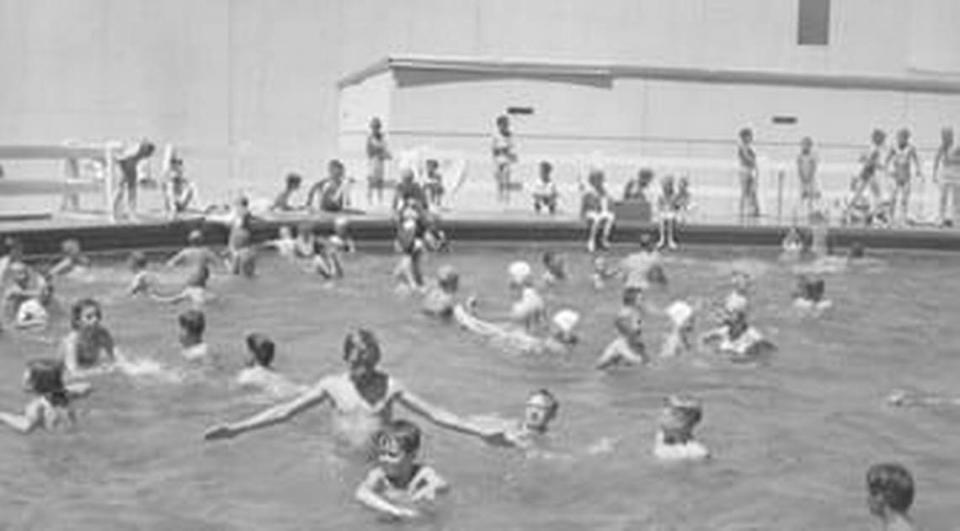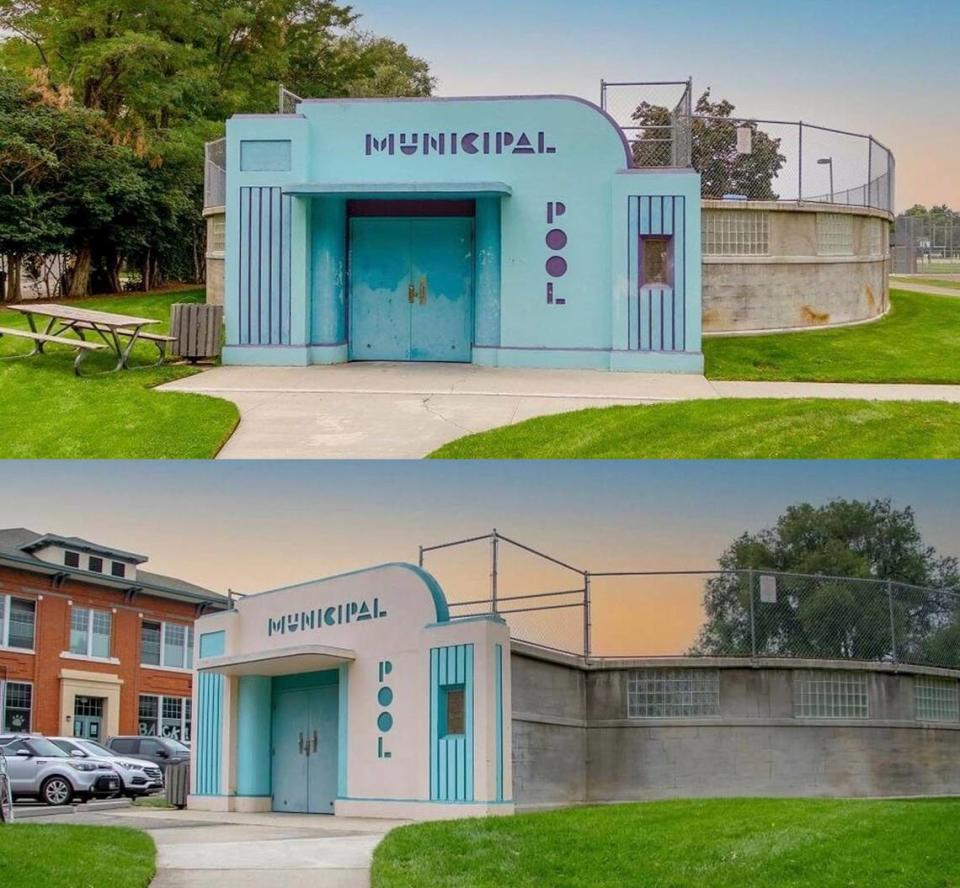During COVID-19, Boise shut down all of its public pools. After the pandemic, it left its two oldest pools — Lowell Pool and South Pool — shuttered amid concerns about their safety and structural integrity, including possible asbestos, corroded pipes and walls and stairs in poor condition, according to the city’s website.
Boise advocates for historic preservation have been vocal since about their desire to restore and reopen the pools, which are two of the last of their architectural style in the country.

“For so many years, we feared potential demolition of both historic municipal pools,” Laura Bainbridge, vice president of Friends of Boise Historic Pools, told the Idaho Statesman in an email. She founded the organization in 2021 when it became clear Lowell and South pools, which were built in 1953, would not reopen.
On Tuesday, Bainbridge said she was surprised but relieved to learn the city’s plans for the pools, which she called a “good compromise.” Boise will renovate Lowell Pool, at 1601 N. 28th St., to bring it up to code, and will replace South Pool, at 921 S. Shoshone St., with a new pool at nearby Whitney Elementary School.
The new pool, five blocks away from its original site, will more than double the number of residents within a 10-minute walk of the site and increase options for amenities and programming, Doug Holloway, the city’s director of parks and recreation, told the City Council on Tuesday.
“We are calling this a win!,” Bainbridge wrote.
But other preservation advocates were less pleased about what they saw as ambiguity around the likely extent of renovations of Lowell Pool, as well as the loss of South Pool in its current form.
The fate of the structure of South Pool, and its current site, remains a “wild card,” Holloway said. In the days leading up to the meeting, advocates for historic preservation had sent a flurry of emails and messages about their fear that South Pool would be demolished.
“Boiseans have treasured these beloved community assets for over 70 years, and (we are) not satisfied with the retention of one and the demolition of another,” according to an email Preservation Idaho sent July 12 to Mayor Lauren McLean. “Despite their identical design, each of these pools has its own history and importance within their respective neighborhoods.”
During the meeting, Council Member Jimmy Hallyburton repeatedly expressed a desire to get creative about how to preserve the history of the South Pool site, even if it won’t be used as a pool anymore. He cited the Boise Depot as one example of what the city could do.
“It’s not a not a spot for people to get off and on trains anymore, but it’s a great event center,” he said.
Council Member Luci Willits, too, expressed her desire to somehow preserve South Pool.
“It will break my heart if something happens to that structure,” she said.
Preservation Idaho expressed its disappointment with the decision, as well as the lack of public input in the decision-making process.
“We are concerned that the city is undervaluing Boise’s Bench history with this decision, especially given the loss of almost all the historic schools in the area in decades past,” board member Paula Benson wrote in a Wednesday email to the Statesman. “Preservation Idaho is glad that Lowell will be rehabilitated, but is unclear what that means and whether it will be preserved or modified to the extent that it diminishes its historic significance.”
As for South Pool, its loss “as a public pool is not preservation regardless of what the city chooses to do with the structure,” she wrote. “A historic building without a use is an endangered historic building, and the city needs to work quickly to identify a compatible new use for the South Pool.”
Lowell, South Pools are ‘beloved community assets’
The pools were designed by engineer Wesley Bintz, who was known for a patented above-ground pool design. South and Lowell Pools are two of about a dozen remaining Bintz pools in the country, out of more than 100 built between the 1910s and 1960s, according to the city of Boise’s website. Fans of the style have created a Facebook page to chronicle his work.

In 2022, the city was weighing whether merely to bring the pools up to code or to redesign the pools while keeping the historic Art Deco facades of their entrances. Art Deco is a design style from the 1920s and 1930s known for its geometric, fragmented appearance.

A design team in 2022 gave the city “very, very high-level, ballpark figures,” Holloway told the Idaho Statesman in February.
The city held open houses in 2022 to gauge residents’ opinions about the pools’ future, the Statesman previously reported, and it conducted surveys of community members that drew thousands of responses, according to the city’s website. Most respondents were in favor of renovating and reopening the existing pools and preserving their “unique architecture and history,” according to an analysis of survey responses.
“The Lowell and South Pools are beloved community assets that serve both a functional community need and celebrate a part of Boise’s rich history,” analysts wrote. “The community is eager for these pools to re-open. Many respondents indicated that the pool closure in 2020 was a major loss for their families and neighbors.”
Building a new pool at Whitney Elementary will cost the city about $7.8 million, Holloway predicted on Tuesday, while the renovations of Lowell Pool will cost $9.2 million. Renovating South Pool at its current site would have cost about the same.
Holloway noted that these costs incorporated some amount of inflation, envisioning project completion around 2026.
The specter of rising construction costs lent the discussion a sense of urgency as council members weighed whether and how to solicit the public’s feedback on their plan.
“Time is our enemy on this; the costs are only going to increase,” said council President Colin Nash.
Of concern, too, was the idea that simply renovating each pool at its current site would not allow for any additional amenities, like slides or diving boards.
“If we renovate both pools,” Nash said, “we’re going to spend $20 million on two pools that me and Council Member Morales are going to drive past every single time so we can go to Ivywild,” a pool on South Leadville Avenue that has multiple slides.
Council Member Pro Tem Meredith Stead, too, projected confidence about taking the plunge without another round of public input.
“I think when you outline that the attendance, the visits, the folks in the community that it will reach — doubling the size and the availability — I think it’s a no-brainer to give that gift to the community,” she said.
The city logged nearly 4,000 visits to South Pool and over 5,000 visits to Lowell Pool in 2019.
What will happen to 2 long-closed Boise pools? And will their historic facades be saved?
Want to enjoy the weekend heat but not in Boise’s ‘dangerous’ rivers? Here are some spots
EMEA Tribune is not involved in this news article, it is taken from our partners and or from the News Agencies. Copyright and Credit go to the News Agencies, email news@emeatribune.com Follow our WhatsApp verified Channel





